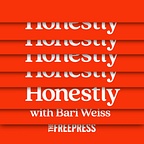The Exodus—the story of the Israelites’ freedom from Egyptian slavery 3,000 years ago—is the ultimate story of freedom. And not just for Jews. But for people seeking liberation from subjugation in so many other times and places. Including here in America.
From the founding fathers, to abolitionists like Harriet Tubman and Frederick Douglas, to president…
Continue Reading The Free Press
To support our journalism, and unlock all of our investigative stories and provocative commentary about the world as it actually is, subscribe below.
$8.33/month
Billed as $100 yearly
$10/month
Billed as $10 monthly
Already have an account?
Sign In
Make a comment
Share article



